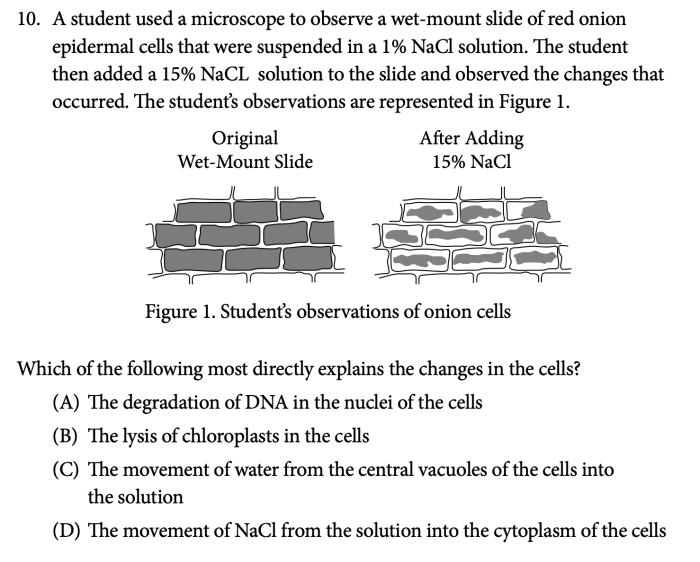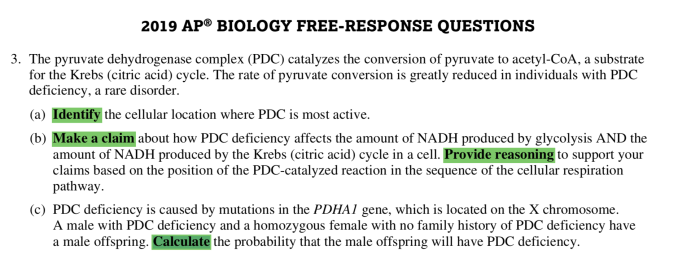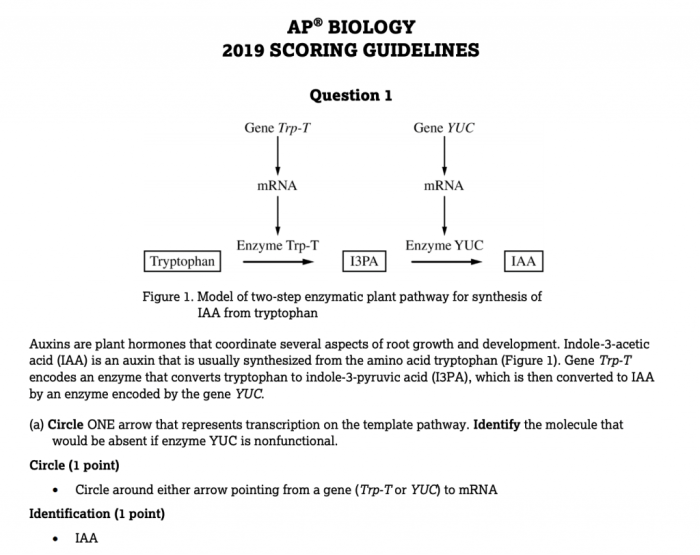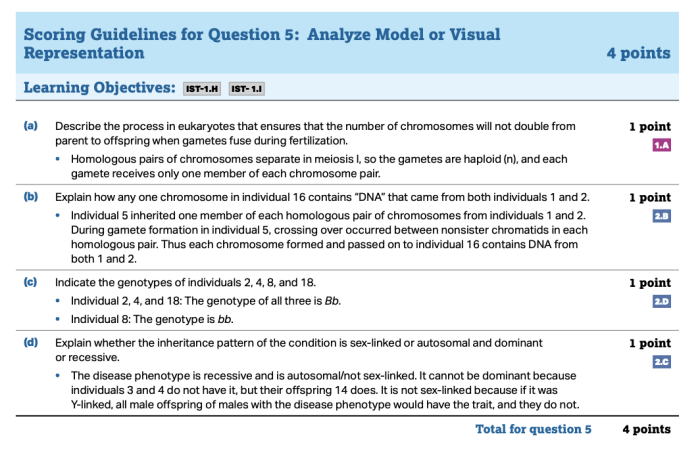Prepare to conquer the AP Bio 2020 Practice Exam 1 FRQ with our expert insights and guidance. Dive into the exam’s structure, key concepts, and proven study strategies to maximize your score.
Our comprehensive analysis unveils the intricacies of each exam section, empowering you to tackle any question with confidence. Get ready to excel in AP Biology!
Exam Overview

The AP Biology 2020 Practice Exam 1 is designed to provide students with an opportunity to practice the types of questions that they will encounter on the actual AP Biology exam. The exam is divided into two sections:
- Section I: Multiple Choice (60%)
- Section II: Free Response (40%)
Section I consists of 60 multiple-choice questions that cover all of the topics in the AP Biology curriculum. Section II consists of two free-response questions that require students to demonstrate their understanding of the concepts covered in the curriculum.The AP Biology exam is a challenging exam, but it is also an important one.
A good score on the AP Biology exam can help students earn college credit, place into higher-level biology courses, and stand out in the college admissions process.
Content Analysis: Ap Bio 2020 Practice Exam 1 Frq

The AP Biology 2020 Practice Exam 1 FRQ delves into various key concepts and themes central to the AP Biology curriculum. The exam primarily focuses on assessing students’ understanding of:
- Cellular and molecular biology
- Genetics and evolution
- Ecology and evolution
- Research methodologies and data analysis
Specific examples of questions include:
- Describing the structure and function of cell membranes and explaining how they maintain homeostasis.
- Analyzing DNA sequences to determine the genetic basis of inherited traits.
- Interpreting ecological data to identify patterns and relationships between organisms and their environment.
- Designing and conducting experiments to test hypotheses and draw conclusions.
The exam is generally considered to be of moderate difficulty, with a mix of multiple-choice, short-answer, and essay questions. The multiple-choice questions test students’ recall of factual information, while the short-answer and essay questions require students to apply their knowledge to solve problems and explain complex concepts.
Student Preparation

Preparing for the AP Biology exam is a significant undertaking that requires a strategic approach and consistent effort. By adopting effective study habits, utilizing available resources, and managing time wisely during the exam, students can enhance their chances of success.
Study Strategies and Resources
Effective study strategies involve active learning techniques such as regular review, practice questions, and concept mapping. Utilizing high-quality textbooks, online resources like Khan Academy and Crash Course, and practice exams provided by the College Board can supplement classroom learning.
Time Management and Pacing
Time management is crucial during the exam. Students should allocate time wisely for each section, ensuring they complete all questions within the allotted time. Pacing oneself involves skipping difficult questions initially and returning to them later, utilizing the time effectively.
Exam Scoring

The AP Biology exam is scored on a scale of 1 to 5, with 5 being the highest possible score. The exam is divided into two sections: a multiple-choice section and a free-response section. The multiple-choice section is worth 60% of the total score, and the free-response section is worth 40% of the total score.
For those tackling the AP Bio 2020 Practice Exam 1 FRQ, seeking additional support may be beneficial. Consider exploring resources like tutor for dmv written test , which provide comprehensive guidance for various subjects. By incorporating such assistance into your preparation, you can enhance your understanding of complex biological concepts and ace the exam with confidence.
Multiple-Choice Section
The multiple-choice section consists of 60 questions. Each question is worth 1 point. Students are given 90 minutes to complete the multiple-choice section.
Free-Response Section
The free-response section consists of 6 questions. Each question is worth 10 points. Students are given 90 minutes to complete the free-response section.
Levels of Performance, Ap bio 2020 practice exam 1 frq
The College Board has established six levels of performance for the AP Biology exam. These levels are:
- 5 – Extremely well qualified
- 4 – Well qualified
- 3 – Qualified
- 2 – Possibly qualified
- 1 – No recommendation
Students who score a 3 or higher on the AP Biology exam are considered to be qualified for college-level biology courses.
Evaluation of Student Responses
Student responses to the free-response questions are evaluated based on the following criteria:
- Content – The student’s response demonstrates a clear understanding of the biological concepts being tested.
- Organization – The student’s response is well-organized and easy to follow.
- Clarity – The student’s response is clear and concise.
- Mechanics – The student’s response is free of grammatical and spelling errors.
Students who demonstrate a high level of proficiency in all four of these areas will earn a high score on the free-response section of the AP Biology exam.
Historical Trends

Analyzing past Advanced Placement (AP) Biology exams provides valuable insights into the evolution of the exam, content trends, and difficulty levels. This analysis helps students and educators identify patterns and anticipate potential changes in future exams, thereby informing preparation strategies and improving overall performance.
Content Trends
- Over the years, the AP Biology exam has consistently covered core concepts in biology, including cell biology, genetics, evolution, and ecology.
- However, the specific emphasis on different topics has shifted over time, reflecting advancements in scientific research and the changing nature of the field.
- In recent years, there has been an increased focus on molecular biology, biotechnology, and environmental science, reflecting the growing importance of these areas in modern biology.
Exam Format and Scoring System
- The AP Biology exam has undergone several format changes over time.
- In 2013, the exam was redesigned to include a greater emphasis on inquiry-based questions and data analysis.
- The scoring system has also been revised to provide more detailed feedback to students on their performance.
Impact on Student Preparation
- Understanding historical trends in the AP Biology exam is crucial for students preparing for the exam.
- By studying past exams, students can gain insights into the types of questions they can expect and the level of difficulty they need to be prepared for.
- Additionally, analyzing content trends can help students focus their studies on the most important topics and prepare effectively for the exam.
FAQ Overview
What is the format of the AP Bio 2020 Practice Exam 1 FRQ?
The exam consists of six free-response questions that assess your understanding of core biological concepts.
How can I effectively prepare for the exam?
Focus on reviewing key concepts, practicing with past exam questions, and managing your time wisely during the exam.
What are some common mistakes to avoid on the exam?
Avoid vague or overly broad answers, ensure your responses are well-organized, and proofread your work carefully.
